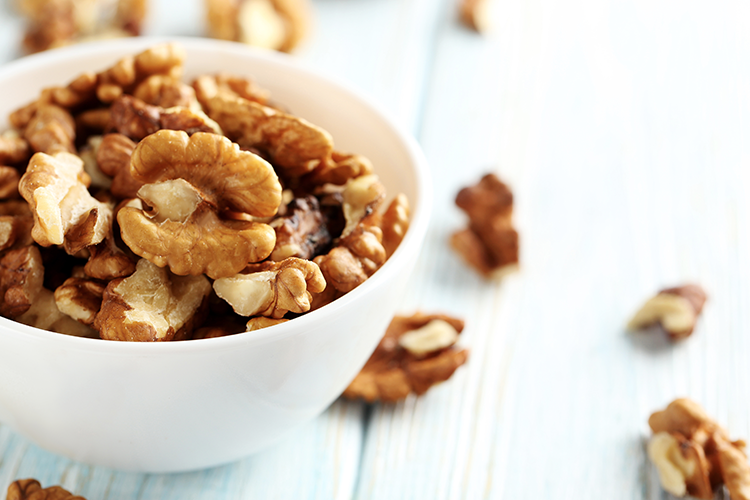Blog
Are walnuts our friend for curbing cravings?
 Sugar cravings can come on hard and fast. Despite the best of intentions and that almighty, yet elusive, willpower, it can be hard to resist. You have a little, which turns into a lot, and that limit of 6 teaspoons of added sugar per day has been forgotten.
Sugar cravings can come on hard and fast. Despite the best of intentions and that almighty, yet elusive, willpower, it can be hard to resist. You have a little, which turns into a lot, and that limit of 6 teaspoons of added sugar per day has been forgotten.
Well, friends, do not fret. The occasional sugar-binge is not the end of the world!
We’ve some ideas to help contend with sugar cravings and dependence, but there is another strategy in town that may help regulate hunger and cravings and therefore manage our sweet addiction.
Enter walnuts.
The study
According to a recent randomized, placebo-controlled, double-blind, cross-over trial, eating walnuts may help curb cravings for highly desirable foods – like those high in added sugar.1
Now, it needs to be noted from the get-go that this study involved a very small sample size.
However, methods utilized within the trial give it some cred.
A previous study has noted walnut consumption, compared with placebo, was more effective in producing feelings of fullness. This can help curb appetite.2
Not surprising considering walnuts, like all nuts and seeds, are crammed with fibre, protein and healthy fats – all nutrients that help one feel fuller quicker and for longer.
This latest study also noted that participants felt fuller, but it also monitored brain activity following walnut consumption.
10 volunteers living with obesity participated in 2 5-day live-in sessions. Onsite, at Beth Israel Deaconess Medical Center’s Clinical Research Center, they were monitored for exact nutritional intake (something most nutrition research is unable to achieve, relying often on reflective and observational data) and fed each morning a smoothie – either one with walnuts or the placebo smoothie without walnuts that was comparable nutritionally and in flavour.
At that point, neither the participants nor the researchers knew who was consuming what.
On day 5 of each of the 2 sessions, participants underwent a fMRI, and the results gave insight as to why walnut-consuming participants generally felt less hungry over the week.
A part of their brain, the right insula, would light up when shown pictures of highly-desirable foods such as desserts and burgers (as opposed to less desirable vegetables, or not-at-all desirable flowers and rocks). It is thought when this area of the brain is activated, there is greater cognitive and appetite control. As a result, participants were more likely to select healthier, or ‘less desirable’ options over the ‘more desirable’ junk.
“This is a powerful measure,” said lead study author Christos Mantzoros. “We know there’s no ambiguity in terms of study results. When participants eat walnuts, this part of their brain lights up, and we know that’s connected with what they are telling us about feeling less hungry or more full.”
So are walnuts the miracle, craving-busting food we’ve been looking for?
Well, while these are positive outcomes, it is still early days as researchers are yet to establish exactly how the walnuts influence such an outcome (and keep in mind, the researchers did request and receive some funding from the California Walnut Commission, though the commission had no input on the research whatsoever).
What do we take from this?
While no one food is the saviour of us all (we really must consider everything we put into our bodies in the context of our ENTIRE diet – essentially, the more real, whole food you eat, the better off you’ll be), this is an interesting outcome.
Nuts we are big fans of, and for a multitude of reasons support health while helping combat desires for not-so-helpful foods by being an excellent source of fibre, protein and healthy fats.
So why not give it a go? See for yourself if, as a snack or added to your breakfast, lunch or dinner, enjoying some brain-shaped walnuts daily helps your sugar and junk cravings decline.
By Angela Johnson (BHSc Nut. Med)
References
- Farr, OM, Tuccinardi, D, Upadhyay, J, Oussaada, SM, & Mantzoros, CS 2017, ‘Walnut consumption increases activation of the insula to highly desirable food cues: A randomized, double-blind, placebo-controlled, cross-over fMRI study’, Diabetes, Obesity & Metabolism.
- Brennan, A, Sweeney, L, Liu, X, Mantzoros, C, Brennan, AM, Sweeney, LL, Liu, X, & Mantzoros, CS 2010, ‘Walnut consumption increases satiation but has no effect on insulin resistance or the metabolic profile over a 4-day period’, Obesity (19307381), vol. 18, no. 6, pp. 1176-1182.











